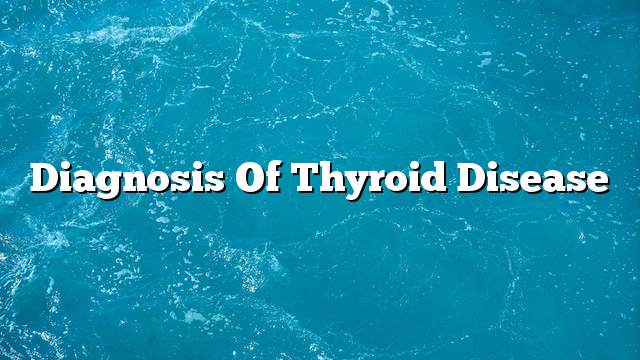Diagnosis of the disease
Blood tests are performed first, as the thyroid gland secrete two hormones called thyroxine T4 and triiodothyronine T3. They are secreted after response to the hormone produced by the pituitary gland called the thyroid stimulating hormone
The hormones produced by the thyroid gland inhibit secretion of the hormone stimulating the thyroid gland through the so-called feedback and thus maintain a certain proportion of hormones in the blood, so the most important examination of the thyroid gland is the examination of these three hormones, in the case of deficiency T3 and T 4 and increase hormone The thyroid stimulator is called hypothyroidism. In the case of hypothyroidism, hypothyroidism is called secondary hypothyroidism. In the case of increased T3 and T4, the thyroid hormone deficiency is called primary hypothyroidism. In the case of increased T3 and T4, The thyroid gland is called P I thyroid secondary
Tests are also used to check the thyroid gland for ultrasound if it is abnormal in size or shape. The tests used to take a sample of the thyroid gland by suctioning the needle in the case of swelling to make sure that this swelling is not malignant, Or scan the thyroid gland, and the image of the thyroid gland is a picture taken after the intravenous injection of radioactive iodine or to another substance such as technetium, where this photo enables us to identify the nodules that secrete large amounts of the hormone called the nodules warm
The thyroid gland is one of the endocrine glands located at the bottom of the neck. Two hormones, thyroxine T4 and triiodothyron 3, are secreted. The function of their hormones is to regulate and accelerate vital activities throughout the body. Its disease results from increased secretion of these hormones, Or lack of secretion of these hormones called thyroid insufficiency
Symptoms of hyperthyroidism are many of the most important increase appetite and weight loss and diarrhea and increased heartbeat and menstrual cycle disorders in women. The symptoms of hypothyroidism are loss of appetite, weight gain, constipation, lethargy, etc. The diagnosis is based on the work of thyroid screening, T4 and T3 and thyroid stimulating hormone
Treatment of hypothyroidism is based on giving the patient fibotheroxine. Treatment of hyperthyroidism is a surgical, radiological and pharmacological treatment.
